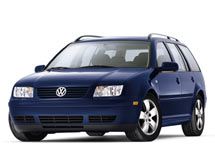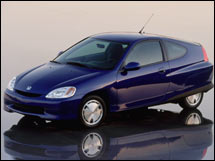NEW YORK (CNN/Money) -
The words "hybrid automobile" conjure images of a squeaky-clean, environmentally friendly future. Contrast that with "diesel," which makes people think of smelly, soot-belching trucks and buses.
You might be surprised to know that diesel-powered cars are seen by automakers and even some environmentalists as just as promising for the environment as those oh-so-fashionable hybrids.
 |
|
| Volkswagen Jetta TDI Diesel |
That promise stems from diesel's proven ability to deliver 20 to 40 percent better fuel economy than gasoline-powered engines. Lifting the fuel economy of America's fleet is the surest path to cutting greenhouse gas emissions like carbon dioxide, which many scientists link to global warming and its pernicious effects on the world's climate.
And with light trucks (SUVs, pickups and minivans) dragging the nation's fuel economy to its lowest point in two decades, an impatient government appears ready to demand better performance from those light trucks. They currently must achieve an average just 20.7 mpg, compared with 27.5 mpg for passenger cars.
Those twin missions -- boosting fuel economy and cutting greenhouse gases -- are tailor-made for the diesel. But only if it overcomes some technical and regulatory hurdles. That, and a nation of skeptical consumers who still remember the notoriously loud, smoky, claptrap diesel engines of the '70s and '80s.
 |
|
| Honda Insight Hybrid |
Hybrids, which combine one or more electric motors with an efficient gasoline engine, promise another way to cut pollution drastically from cars. Ford's hybrid version of its Escape SUV is expected to achieve 35-40 mpg in city driving when it goes on sale to consumers next year. But hybrid technology is expensive and it's not yet clear that automakers can drive costs low enough and sales high enough to make them profitable. Fuel-cell vehicles, powered by hydrogen, are even cleaner, but the technology remains years or decades away from most consumers.
Diesel technology, in contrast, has been around for more than a century. Paris-born Bavarian Dr. Rudolf Diesel patented his first diesel engine in 1893. They work by injecting highly pressurized fuel into cylinders where air has been extremely compressed. Because that ultra-hot air ignites the fuel on contact, no spark plugs are required.
|
|

|
| This story was originally written in May, 2003. It has been updated.
|
|
|
|
Hybrids, on the other hand haven't been around long enough to establish a track record for long-term durability. This is especially true for their batteries. Honda and Toyota say their battery packs are designed for the life of the vehicle, but the batteries do degrade over time, and they currently cost several thousand dollars to replace.
A new animal
While Ford, GM and Chrysler all are developing gas-electric hybrids, engineers also are studying the possibility of expanding their diesel offerings.
"What we call the modern diesel is a lot different from what most consumers know about," said Dick Baker, a Ford research engineer for diesel programs. "We think the North American public would really like diesel vehicles if they experienced them."
| Gas mileage
|

|
|
|
|
European consumers already have embraced diesels, which have soared in popularity to capture about 40 percent of the European market. The engines cost more, but the initial expense is easily offset by improved economy, cheaper diesel fuel and durability that gas engines can't match. Blessed with strong torque -- the pulling power you feel when you punch the gas -- modern turbocharged diesels deliver especially good highway acceleration, and can offer a 500-700 mile range on a single tank.
In the U.S., diesels have been relegated largely to heavy-duty pickup buyers. Among passenger cars, they accounted for only 31,220 sales last year. But consumers soon will see more choices:
- Chrysler, which already exports diesel-powered Jeep Libertys and PT Cruisers to Europe, plans to begin selling diesel Liberty SUVs here later this year. The Liberty can deliver average fuel economy of about 25 mpg, compared with just 17 mpg for the gasoline version.
- Mercedes-Benz, which abandoned U.S. diesels in 1999, plans a comeback later this year with diesel-powered 2004 E320 CDI sedan that. The car will get 27 mpg in city driving and 37 mpg on highways.
- Volkswagen expanded its lineup with a diesel version of its new Touareg SUV for 2004.
- Ford is considering selling a diesel version of its popular Focus compact.
Gas-hogging SUVs could be especially suited to diesels, which offer strong acceleration and towing power while boosting economy. SUVs and pickups that deliver around 15 mpg could surpass 20 mpg with a simple switch to diesel.
Hurdles still to be cleared
Less than a year ago, some automakers were expressing doubt that diesels stood any chance of meeting 2007's drastically tightened U.S. emissions standards, especially for nitrogen oxides.
But recent weeks have brought startling announcements from manufacturers, raising hopes that diesel manufacturers could meet that monumental challenge and become widespread here.
Mercedes is still experimenting with special exhaust traps to capture nitrogen oxides. But the trap might be prohibitively expensive and fall short of the 10-year, 150,000-mile durability required by federal standards. So Mercedes' new low-cost alternative is "urea injection:" A replaceable canister of ammonia-based liquid, automatically injected into the exhaust system, that would neutralize pollutants. The chief drawback? Consumers must be trusted to replace the empty canisters every 13,000 miles during vehicle service, or the vehicle wouldn't properly cut emissions. Ford sees promise in its own urea-based system.
And in France, according to Automotive News, researchers at the Institut Francais du Petrole claimed a huge breakthrough in diesel: A new combustion process that stops emissions at their source, without expensive and complex traps in the exhaust system. Its patented "narrow-angle direct injection" diesel modifies the engine itself, and the Institut said major diesel suppliers could adopt and ready the ultra-clean engines by 2008.
Lawrence Ulrich writes about cars for Money Magazine. You can contact him at autos@money.com.

|

